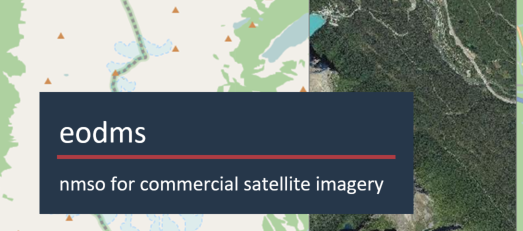Category:DeleteMe
NMSO-CSI Overview
The National Master Standing (NMSO) for Commercial Satellite Imagery (CSI) is coordinated by PSPC for the Government of Canada to procure imagery in support of its various mandates. It has been in place since 2012 and is refreshed every year by DND, NRCan, and PSPC in order to maintain and add new data providers. The current NMSO refresh can be found here: https://buyandsell.gc.ca/procurement-data/tender-notice/PW-19-00860905
EODMS & NMSO-CSI
The Earth Observation Data Management System (EODMS) is the designated Government of Canada site for all commercial imagery procured through the NMSO for both provider delivery and user access.
Did you know that all Government of Canada (GoC) employees can have free access to NMSO Commercial Satellite Imagery (CSI) already purchased by the GoC available on EODMS? You need only send an account request to your Department NMSO point of contact (PoC) for your account approval. You can find the request form and your PoC on our GCPedia (Federal Government-only) page, EODMS Account Approvals for Government and Special Access
License Details
| License Level | License Level Description |
|---|---|
| Level A | The project level, at which a License Class allows Identified Users to only share the data with the designated sharing entities identified in Table A, “License Class Designations”, more specifically “Included Entities” on a project basis; and |
| Level B | The broad level, at which a License Class allows Identified Users to share the data with all users of the designated sharing entities identified in Table A “License Class Designations”, more specifically “Included Entities”. |
| License Class | Included Entities |
| Base/Class 0 | Canadian Government Departments, Agencies, and Crown Corporations |
| Class 1 (A, B) | Base + Canadian Academic Research community affiliated with a recognized University or College |
| Class 2 (A, B) | Base + Provincial and Territorial Governments in Canada |
| Class 3 (A, B) | Class 2 + Local (Municipal, Aboriginal People - First Nations, Inuit, Metis or Tribal Councils) Governments in Canada. Local Governments would include two cities with over 500,000 in population and up to 20 municipalities with less than 500,000 in population |
| Class 4 (A, B) | Base + Local Governments (Municipal, Aboriginal People - First Nations, Inuit, Metis or Tribal Councils) in Canada. Local Governments would include two cities with over 500,000 in population and up to 20 municipalities with less than 500,000 in population |
| Class 5 (A, B) | Civilian Departments of the Government of Canada and their international counterparts as per their mandates. (Example: Canadian Ice Service and US National Ice Center and International Ice Patrol under the North American Ice Service [NAIS]) |
| Class 6 (A, B) | Base + USA Government Agencies (Military and Civilian) e.g. US Department of Defense |
| Class 7 (A, B) | Base + Military Partners (USA, UK, AUS, New Zealand) |
| Class 8 (A, B) | Base + Military Partners (USA, UK, AUS, New Zealand) + 28 NATO Member Countries (See http://www.nato.int/pfp/eapc-cnt.htm.) |
| Class 9 (A, B) | Base + Military Partners (USA, UK, AUS, New Zealand) + 28 NATO Member Countries (See http://www.nato.int/pfp/eapc-cnt.htm .) + any of 21 NATO Partners for Peace
(See http://www.nato.int/pfp/sig-cntr.htm .) |
| Class 10 | Note: Class 10 is replaced by Class 12 below |
| Class 11 | Base + public at large (i.e. Public Good License Class) |
| Class 12 (A, B) | Base + Military and Defence related organizations of foreign countries with which Canada is involved in international duties (example: United Arab Emirates forces in Afghanistan). The list of foreign countries will vary depending on the operations involved. The list of countries will be provided to the Offeror for country list approval prior to sharing. An addendum to the license shall list the countries approved for sharing. |
This category currently contains no pages or media.
